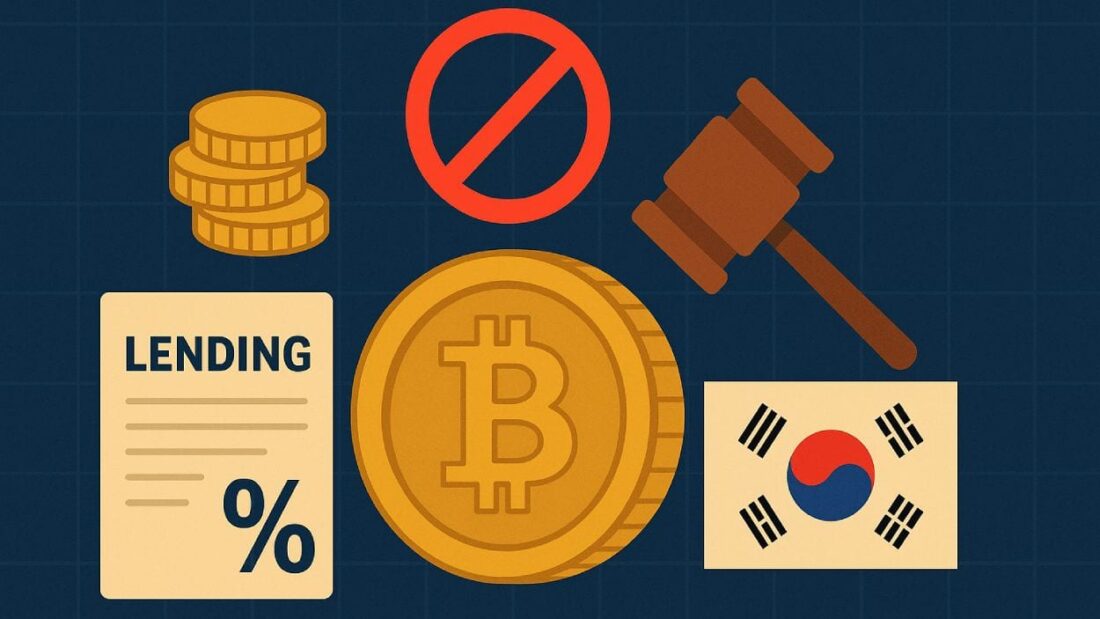South Korea has rolled out strict new guidelines for crypto lending, capping interest rates at 20% and banning loans that exceed collateral value.
Key Takeaways
- Crypto lending interest rates in South Korea are now capped at 20% annually.
- Leveraged loans exceeding the collateral value are banned across all platforms.
- Lending is limited to top 20 cryptocurrencies or those listed on at least three local exchanges.
- Exchanges must use their own funds for loans and follow strict investor protection rules.
What Happened?
South Korea’s Financial Services Commission (FSC) has launched a comprehensive regulatory framework for virtual asset lending, aiming to curb excessive risk and protect investors. The rules apply immediately and follow months of market overheating, sparked by aggressive lending products launched by major crypto exchanges.
🚨 South Korea Tightens Crypto Lending Rules 🚨
— ZendrixBT (@ZendrixBT) September 5, 2025
The Financial Services Commission has unveiled strict new rules that ban leveraged loans, limit interest rates to 20%, and restrict lending to the top 20 tokens or coins listed on at least three won-based exchanges.
First-time… pic.twitter.com/CapV8qllTf
New Rules Reshape Crypto Lending Landscape
The new guidelines, officially titled the Virtual Asset Lending Guidelines, were developed in coordination with the Financial Supervisory Service and the Digital Asset Exchange Association (DAXA). They introduce significant restrictions on how crypto lending can operate in the country.
Here are the key provisions:
- Interest rates on crypto loans are capped at 20% annually.
- Over-collateralized or leveraged lending is completely banned.
- Only cryptocurrencies in the top 20 by market capitalization or listed on three or more Korean won-based exchanges are eligible for lending.
- Lending services must be conducted using the exchange’s own funds.
- Cash-based loan repayments are prohibited, aligning with local credit business laws.
- Third-party lending partnerships are no longer allowed, preventing regulatory loopholes.
These moves come after local exchanges like Upbit and Bithumb began offering aggressive lending services earlier this year. Upbit had allowed users to borrow up to 80% of their deposits, while Bithumb offered loans worth four times user holdings. Regulators quickly responded with a temporary suspension of all lending operations on August 18.
Enhanced Protections for Users
Investor protection is at the heart of these new rules. Exchanges must:
- Provide mandatory online training and conduct aptitude tests for first-time borrowers through DAXA.
- Impose individual lending limits ranging from 30 to 70 million won, depending on the user’s trading history and experience.
- Notify users in advance before forced liquidations.
- Disclose loan status and forced liquidation events publicly.
Cryptocurrencies flagged as cautionary or involved in suspicious activity must be excluded from lending programs. Exchanges are also required to install internal controls to prevent price manipulation from large positions in individual assets.
Background and Global Context
The FSC initiated on-site inspections from August 26 to September 2, uncovering that 27,600 investors borrowed 1.5 trillion won ($1.1 billion) in one month. Alarmingly, 13% of those loans resulted in forced liquidations, underscoring the urgent need for tighter regulation.
South Korea’s crackdown also reflects its participation in global regulatory efforts. The country has adopted the OECD’s Crypto-Asset Reporting Framework (CARF), which will require exchanges to share transaction data with tax authorities starting in 2027. From next year, domestic platforms must report personal and transaction data for residents of CARF partner countries.
The Ministry of Economy and Finance is expected to release further implementation guidelines later this month.
CoinLaw’s Takeaway
I see this as a long-overdue reality check for crypto lending in South Korea. In my experience, when markets move too fast without guardrails, retail investors often get burned. These rules are a smart move to ensure that speculative lending doesn’t spiral into another meltdown. I found it particularly bold that regulators banned third-party lending arrangements, which were often used to dodge oversight. Yes, this may slow some of the growth in crypto lending, but it’s a necessary pause to ensure safety and fairness. If South Korea succeeds, this could set a global standard.


































































